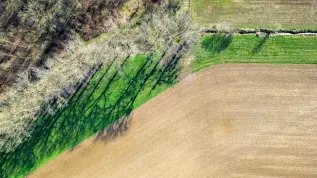
Do cows from Europe give the same amount of milk in the very hot climate of Brazil or Australia, as in friendly conditions of Polish pastures? How to select genetic material so that pigs have better features and bear more healthy piglets? Methods of quantitative genetics are used in livestock farming by Dr. Ewa Sell-Kubiak from the University of Life Sciences in Poznań, who cooperates with the University of Wageningen in the Netherlands.
Globalization of livestock farming means that the genetic material of animals bred in Europe goes to many parts of the world. Animals of European origin may end up living in a very hot climate. It is expected, however, that they will still have the same productivity. How to meet the demands of the market?
"In livestock farming we use quantitative genetics, based on statistical methods. These methods allow to select animals with the most desirable traits from the available animal population. We then try to improve these traits or maintain them at optimum levels in subsequent generations. This can be the amount of milk obtained from a cow, or the number of piglets born in subsequent litters of a sow" - said Dr. Sell-Kubiak.
The winner of the START scholarship of the Foundation for Polish Science researches the possibility of genetic improvement of traits and assesses the breeding value of animals. But whether you can achieve the full potential of the animal, depends on the environment in which it lives. Such differences can be observed at the farm level, for example through the time devoted to animals, the type of feed. There are also other stress factors, related, for example, to disease, climate or temperature. If previous generations lived in a temperate climate, the animals are not even adapted to temperatures which occur during hot weather in recent years in Poland. This may impair their productivity. Especially that not all the environmental factors can be described or observed.
Therefore, Dr. Sell-Kubiak examines the genetic differences between animals resulting from environmental variability. She pursued her doctorate at the Wageningen University in the Netherlands. She also cooperates with Topigs Norsvin, an international company engaged in breeding pigs. The company provides databases of data collected for almost 30 years. The geneticist performs calculations by programming herself or using ready statistical analysis programs. Ewa Sell-Kubiak also works in the newly established Genetic Centre of the Polish Federation of Cattle Breeders and Dairy Farmers, which is engaged in the research and improvement of the Polish population of dairy cattle. She specializes in the genetics of pigs and cows, but - as she assures - her work also applies to other species of farm animals.
"If we want a herd of dairy cows, for which we have presented an assessment of breeding value, to give more milk, we propose such choice of bulls that the successive generations have a higher milk production. This is usually a lengthy process, depending on the length of the intergenerational interval that differs between animal species. The success of selection in the direction of specific traits can only be seen years later" - explained Dr. Sell-Kubiak.
The studies, which Dr. Sell-Kubiak conducted on pigs, the researcher first sought a statistical method that would properly describe the genetic basis of traits. Then the method was modified to be included in the routine calculations in the evaluation of breeding value.
"It is important for companies that the calculations are carried out relatively quickly, e.g. in one day, because breeders are waiting for results of the assessment of the breeding value with a decision about which animals should be kept in the herd. The process - from research to applying research results to farming - is long and resembles solving mathematical-logical puzzles" - Dr. Sell-Kubiak compared. In the future, her research conducted on pigs will help farmers cope with the globalisation of livestock farming.
The START scholarship allows Ewa Sell-Kubiak to performs post-doctoral research and prepare habilitation at the University of Life Sciences in Poznań. She wants to continue cooperation with the two universities - Polish and Dutch, and create a new line of research on the reduction of genetic variability of reproductive traits of pigs resulting from environmental factors.
PAP - Science and Scholarship in Poland, Karolina Duszczyk
kol/ agt/
tr. RL













